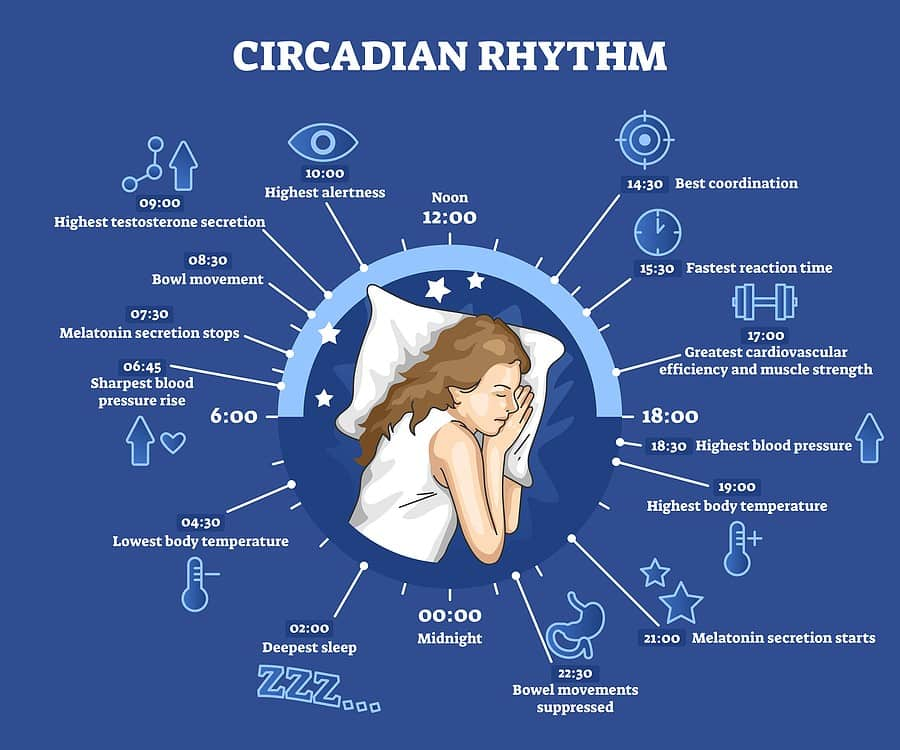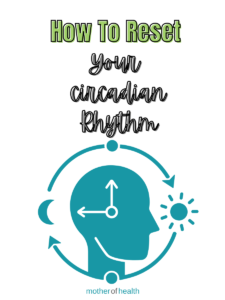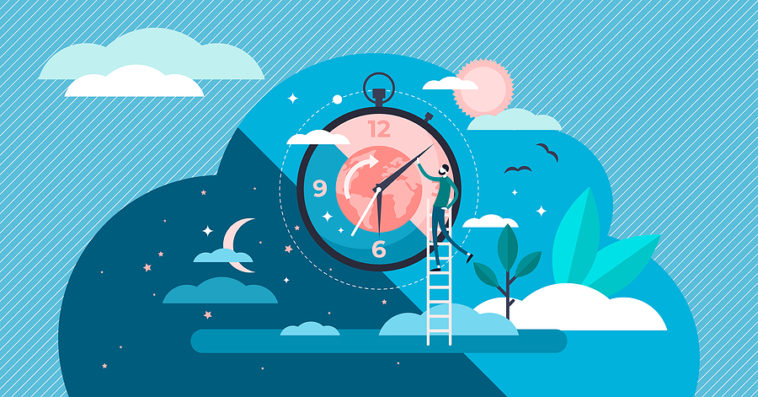So what is your circadian rhythm and how does it work? A circadian rhythm can be translated to ‘around once per day.’
Circadian Rhythm is our body's “internal clock” that tells us when to eat, sleep and wake up. Upsetting our circadian rhythm can result in many health problems. In this article we take a look at how it works, how it gets out of whack, and how you can stay in rhythm.

What is Your Circadian Rhythm?
Our circadian rhythms account for a wide range of actions within the body. In Ayurveda syncing to Mother's nature's rhythms to feel good is known as Dinacharya and is based on the Ayurvedic clock similar to the circadian rhythm.
Circadian rhythms are responsible for a wide range of actions within the body, In fact, you may be surprised to learn our bodies have more than one circadian rhythm, but the most notable one tends to be the natural sleep/wake cycle we experience in a 24-hour period. That is the focus of this article.
Our brains are known as the circadian pacemaker and it is triggered each day to start and stop important functions. Digestion, energy for alertness, and cues for sleep are all managed by a running clock in the background of the brain. This rhythm is what helps humans generate, express, and replenish their energy.
How Does the Circadian Rhythm Work?
Regarding sleeping and waking, the circadian rhythm helps us wake up and stay energized all day and wind down and sleep all night. The critical triggers for waking and sleeping are light and dark and the hours between sunrise and sundown.
At dawn, our bodies are designed to energize and wake up. Throughout the day humans are designed to be alert and awake. As the sun goes down, our bodies produce melatonin which is a hormone designed to shut our conscious brain down and get us sleepy and ready for bed. Nighttime is the typical time for humans to sleep and restore their minds and bodies for another day.
Under ideal circumstances, our bodies develop a natural sleep-wake cycle but that doesn’t mean the natural rhythm can’t be disrupted.
Some factors that prevent or interrupt a natural circadian rhythm, include but are not limited to, jet lag, shift work, blindness, or sleep disorders.
Why We Need to Sleep For Good Health

Sleep is one of the three pillars of health. It is a necessary time for the body to heal and process the day and get ready for another. Many important functions happen while we sleep.
- The brain stores the day's information in our memory
- Detoxifies and removes waste
- Repairs cells and removes waste
- Produces hormones and proteins
Failure to get enough or proper sleep can prevent the brain and body from doing their repair work. Not getting enough sleep can lead to fatigue which can make us more susceptible to illness or injury. It can create brain fog or lethargy and over time can cause chronic problems including:
- High blood pressure
- High cholesterol
- Weakened Immune system
- Insomnia
- Heart attacks
If you have sleep issues, learn how to sleep better naturally here.
Our circadian rhythm is an internal process for getting proper amounts of sleep each 24-hour cycle to ensure our bodies run optimally and recover from a day’s worth of toxins.
Making sure your circadian rhythm runs properly will ensure you are less likely to become sick or develop a chronic illness.
Our circadian rhythm is a built-in timer that helps our brains trigger us to wake up, stay energized, and later wind down and get sleepy. We rely on sleep to help our bodies restore and repair, rid toxins, and produce the energy that we need for another 24-hour period.
Sleep accounts for nearly one-third of our lives. Food, water, and sleep are a trifecta of importance for our health.
Sleep is Important For Your Physical Health
Our bodies rely on sleep to regenerate and rejuvenate. During sleep, our bodies repair and regrow cells. Muscles repair when we are in a state of sleep and rest. Important hormones are released that help balance mood, trigger digestion, and other functions necessary for proper health.
While we sleep our bodies conserve energy and slow down certain functions that operate during the day. This helps us with our longevity and prolongs our stamina and our lifespan.
Sleep Is Important For Our Mental Health
When we sleep our brains are very active. They are sorting through the events of the day and categorizing the mind. While we sleep our brain increases activity in the areas that regulate mood.
Additionally, the brain relies on adequate and high-quality sleep to keep our minds from overreacting during the day. Sleep produces feel-good hormones that help with tolerance and reasoning. Too little sleep can trigger mental health issues and make it much harder to cope with everyday stressors.
Sleep Is Important For Our Defenses
When we sleep our bodies create proteins that fight infection and inflammation. This can help us stave off germs, viruses, and more.
Additionally, failure to get enough high-quality sleep can lead to heart issues, sleep apnea, high blood pressure, and more. Adults need a recommended daily amount of at least 7 hours of sleep per night to stave off these conditions.
3 Activities that Throw Your Circadian Rhythm Out of Whack
Our circadian rhythm is a natural sleep/wake regulator running all day every day. The circadian rhythm is what gives you cues and energy to get up in the morning and signals that you should get ready for bed in the evening. Paying attention to this natural cycle will help you maintain a healthy lifestyle filled with plenty of energy.
If we aren’t careful, we can throw our circadian rhythm out of whack and it can be hard to get things back on track once it’s off the rails. Our circadian rhythm can be affected by biology or environmental factors.
Here are some activities that can disrupt your circadian rhythm and leave you vulnerable to sleep-related illnesses or injuries.
1. Shift Work
Our bodies are designed to rise with the sun and set with it too. When we work unusual shifts that go against the natural sleep/wake cycle it can cause problems.
Most people are not suited for shift work. Graveyard and swing shifts may require you to break the cycle and disrupt the natural production of melatonin and cortisol. This can make it hard to sleep during the day when you are off duty and hard to work at night when you are on-duty.
Be sure to create an environment where you can get adequate sleep when you are off duty. Resist the urge to push through to try to maintain a ‘normal’ routine.
Sleep is vital whether you work at night or during the day. Don’t put sleeping off or you may trigger a host of health problems.
2. Being a Night Owl
Some people don’t get tired when they should. This can create the habit of staying awake when the body naturally wants to sleep.
Staying up late occasionally won’t do much harm, but chronically going to bed after 11:00 pm can contribute to a disruption of the circadian rhythm. If you are unable to fall asleep or get the minimum 7 hours recommended, it can lead to chronic fatigue and dangerous health issues.
Resist the urge to stay up late more than a few nights per week. Do your best to maintain a healthy bedtime schedule and limit activities that energize or wake you when you should be sleeping.
3. Using Technology Before Bedtime
It wasn’t that long ago that technology at bedtime was limited to either television or radio. Now there are a wide range of ways to be stimulated at bedtime when you should be winding down.
Screen time is detrimental to the circadian rhythm and can lead to insomnia and even depression. Phones, tablets, and other screens should be limited an hour or two prior to bedtime and never used in bed.
Create a healthy bedtime routine that includes putting devices down after dinner. Engage in activities that are calming and conducive to going to sleep. Take a hot shower or bath, read, lower the lighting in your rooms, drink hot decaffeinated tea. Here are 8 more bedtime rituals to sleep better naturally.
Either biological or environmental factors can disrupt our circadian rhythm. When it comes to biology, we may not have much control over how our bodies react to sleep, but avoiding the things within our control is important. Don’t take risks with your sleep, be sure to set yourself up for success and get the best night’s sleep possible.
3 Activities that Put your Circadian Rhythm Back on Track
Scrolling through your feed in bed isn’t compatible with your circadian rhythm any more than working the night shift is. It’s important to protect our natural rhythm and work with it to help keep us healthy and full of energy.
While there are plenty of ways to get your circadian rhythm out of whack, there are also simple ways to get it back on track.
Here are 3 activities you can use to maximize your body’s natural sleep/wake cycle.
1. Get Out In The Light
Our rhythm is tied to a 24-hour internal clock that is regulated by the rise and setting of the sun.
Being in the light reminds our bodies to be active and alert. Hormones like cortisol help us stay active and our digestion moves along so we feel hungry and desire to eat for fuel. Being in the dark triggers the production of melatonin and slows down our digestion leading to sleepiness and lethargy.
Get out into the sunshine or even under an overcast sky to help your body find its natural rhythm. Open the curtains in your home and let the sunlight or daylight in. Avoid keeping the shades drawn and the room too dark during the daytime.
2. Create and Keep a Sleep Schedule
When your body wakes and goes to sleep at the same time each day it gets back into rhythm. You can help your circadian rhythm reach its optimal state by setting and keeping to a regular sleep schedule.
Determine when you need to wake each morning and count back 7-8 hours to determine when you need to be in bed for the recommended hours of sleep. Be sure to add an hour to get ready and into bed on time.
Help your family keep and maintain a regular sleep schedule too. The whole family will benefit from a good night’s rest and having a regulated circadian rhythm.
3. Eat Well and Exercise
Your body doesn’t rely on one function at a time to be its best. The body works in harmony and the mind and the body are one. What you eat and the amount of movement you get during the day can help set and maintain your circadian rhythm.
Eating healthy foods contributes to your body’s overall health. Eating foods high in salt, fat, and sugar can cause digestive issues, blood pressure issues, and illnesses like diabetes. These can affect your sleep patterns.
Exercise helps create mood-stabilizing hormones and wears your body out so it’s tired and ready for bed.
Be sure to eat a healthy diet filled with healthy fats, plenty of fruits and veggies. Get out each day into the light and get your heart rate up for at least 20 minutes. You can also take walks or do other low-impact exercises, including yard work which meet the requirements for light exposure and exercise all in one.
There are things you can do to get your circadian rhythm back on track and keep it there. Eat well, exercise and keep a regular bedtime. These not only help with sleep they improve mood, fight illnesses and disease, and keep your body in shape.
Top Tips to Help you Get More Sleep and Stay in Rhythm
![]() Our circadian rhythm is a wondrous built-in sleep regulation system driven by the rise and fall of the sun.
Our circadian rhythm is a wondrous built-in sleep regulation system driven by the rise and fall of the sun.
Adding a few more tips to your toolbox will help you get a better night’s sleep and feel amazing each and every morning.
Here are three more top tips to help you get more sleep and stay in rhythm
Top Tip #1 – Make your bedroom a sleeping haven
Top Tip #2 – Stop drinking after dinner
Top Tip #3 – Consider a weighted blanket
These tips can make a big difference and help you get to sleep and stay asleep. This will help ensure your body enters REM (Rapid Eye Movement) sleep state which is the time your body does the repair work it needs for the next day.
Make your bedroom a sleeping haven – Your bedroom should be designed to help you get the best night’s sleep possible. Achieve this by checking these things off your list:
Comfortable bedding with sheets that feel amazing – Buy the highest quality sheets and blankets you can afford. Be sure your mattress is comfortable and have the right pillows for the sleep position you prefer. Make your bed each day and turn the covers down just before bed. Clean and change your sheets often to keep them fresh.
Temperature controlled environment – Keep the temperature in your room cooler for better sleep. Being too warm can prevent you from falling into deep sleep. For some, the white noise of a fan also helps them sleep better plus it keeps things cooler.
Make sure the room is dark – Light stimulates energy. Be sure your room is dark when you sleep. Having too much light can make it harder to fall into deep REM sleep. If you are sensitive and a light sleeper, too much light could be a problem.
Stop drinking after dinner time – One of the main reasons people don’t get enough sleep is frequent trips to the bathroom throughout the night. While it’s important to get enough water each day, try to consume it during the day and end at dinnertime. Also, avoid caffeinated beverages by early afternoon if you have an early bedtime.
Consider a weighted blanket and other sleep aids – Some people sleep better when they are comforted by a weighted blanket. You may have seen swaddling techniques that help newborns sleep better in the first months of life. The same principle applies to children and adults in a slightly different way. Light pressure can ease anxiety- which can amplify at night, and help restless people sleep more soundly.
Additionally, other sleep aids like sleep sound machines, guided meditation for sleep, or apps designed for helping you fall and stay asleep may be a good idea for a better night’s rest.
These top tips are sure to help you make the most of bedtime and get a better night’s sleep than you’ve had in a long time. See which work best and incorporate them into your nightly routine.
Don't forget to follow us on Pinterest. Thank you for your time and reading.
The information presented here is in no way meant to serve as medical advice. If you are experiencing symptoms of any kind, please consult with your physician.




